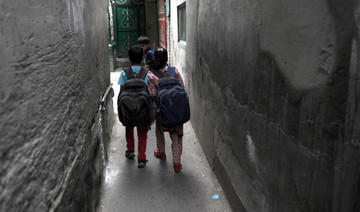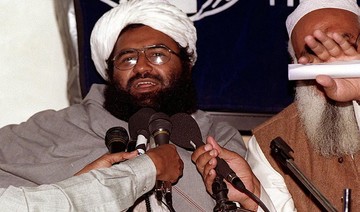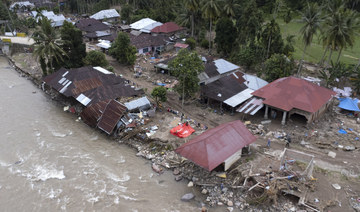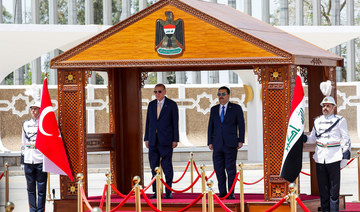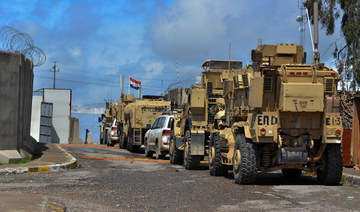ISLAMABAD: At a mosque on a quiet Islamabad street, any reference to the UN-listed terror group which runs it has been removed as Pakistan — once again — comes under pressure to demonstrate its sincerity about eliminating militancy.
The first wave of militant detentions was announced by Islamabad on March 5, as tensions were still cooling between India and Pakistan after their latest confrontation over the disputed Kashmir region.
New Delhi has long accused Islamabad of harboring militant groups, which it says are used by Pakistan intelligence agencies to attack India.
The February 14 suicide blast in Indian-administered Kashmir — claimed by Pakistan-based Jaish-e-Mohammed — is the latest example, and the attack which ignited the recent crisis between the nuclear-armed neighbors.
Since March 5, Pakistani authorities have arrested hundreds of suspected Islamist militants and shuttered more than 700 madrassas, mosques, and clinics linked to banned groups.
Mosques like the Al-Quba mosque visited by AFP in Islamabad — which is run by Jamaat-ud-Dawa (JuD), seen by the UN as a charity front for an anti-India militant group — have had all signs announcing their links to such organizations removed.
Instead, a green sign clinging to a post proclaims the new management of the premises by the “Government of Pakistan.”
“This government will not allow Pakistan’s land to be used for any kind of outside terrorism,” vowed Prime Minister Imran Khan earlier this month.
But the crackdown is reminiscent of previous efforts, and Pakistan has yet to convince the international community that their latest thrust is sincere.
Cracks have already begun to emerge after Pakistan’s longtime ally China this week blocked measures by the UN Security Council to blacklist JeM leader Masood Azhar.
It was the fourth time China has blocked such attempts, reinforcing suspicions that it was acting on Pakistan’s behest. If so, observers said, the move undermined the sincerity of the crackdown.
Had Azhar been blacklisted, Pakistan would have been morally compelled to halt his activities, a Western diplomat said.
“Is Pakistan just trying to fool us?” the diplomat asked. “I would say yes.”
New Delhi also remained skeptical.
“The widespread presence of terrorist camps in Pakistan is public knowledge within and outside Pakistan,” said Indian foreign ministry spokesman Raveesh Kumar last week.
The crackdown has largely targeted JeM along with JuD, which is linked to Lashkar-e-Taiba, the group accused by India and Washington of masterminding the terrorist attacks in Mumbai in 2008.
Shuttering groups like JuD — which provides widespread and vital services like health care to poor communities in a developing country where government-run social services are sorely lacking — risks a potential backlash.
“We were ordered to close the health centers and give our ambulances to the authorities,” Akbar Khan, a JuD official based in the northwestern city of Peshawar, said.
“Our leaders asked us to accept everything and to keep a low profile,” he added.
A source close to JeM said the ongoing operation was unprecedented in its scale.
“Almost the entire leadership of JeM has been detained, all the clerics and head clerics have been replaced and administrative control of all our mosques have also been taken over,” said the source.
“We have never seen such harsh steps in past.”
However, the operation mirrors similar crackdowns on militants, such as after attacks on the Indian parliament in 2001 and in Mumbai in 2008.
Then, extremists were also detained — only for many to be released later, and the groups allowed to continue their activities, both militant and charitable.
Pakistan has also not yet demonstrated its willingness to go any further than detentions and closures.
“Closing major infrastructures is a very important step, but it doesn’t show that the whole network has been dismantled,” said analyst Huma Yusuf, a fellow with the Washington-based Wilson Center.
“There are still thousands of militants in the country. What do you do with them? A peace and reconciliation process? A deradicalization plan? Anything? Right now, there is nothing.”
The crisis also comes as Pakistan is facing possible sanctions from the Financial Action Task Force — an anti-money laundering monitor based in Paris — for failing to rein in terror financing.
The organization will soon decide whether to add Pakistan to a blacklist that would trigger automatic sanctions, further weakening Pakistan’s already faltering economy.
Analysts fear even those headwinds may not be enough to convince the Pakistani intelligence agencies to cut their alleged ties with militants.
“Why would they give away something that they have created, nurtured and defended for 30 years?” said author Myra MacDonald, a researcher specializing in Pakistan.
“There is a concern that if you hit them too hard, they will hit the Pakistani state back.”
Pakistan’s crackdown on militants fails to convince skeptics
Pakistan’s crackdown on militants fails to convince skeptics
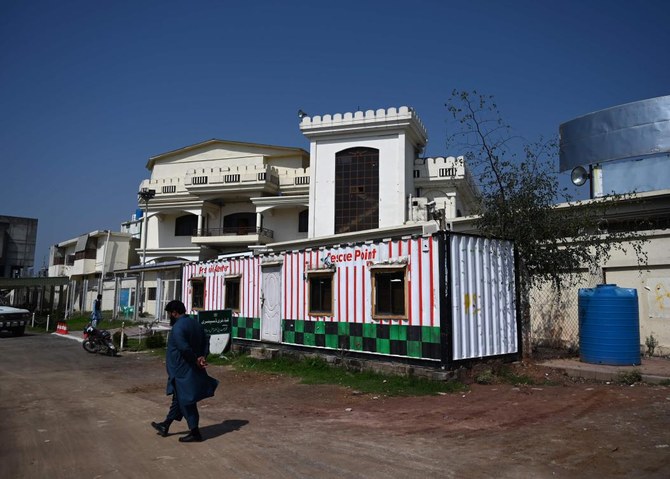
- The first wave of militant detentions was announced by Islamabad on March 5
- Pakistani authorities have arrested hundreds of suspected Islamist militants and shuttered more than 700 madrassas, mosques, and clinics linked to banned groups
At least five migrants died during attempt to cross English Channel - La Voix du Nord
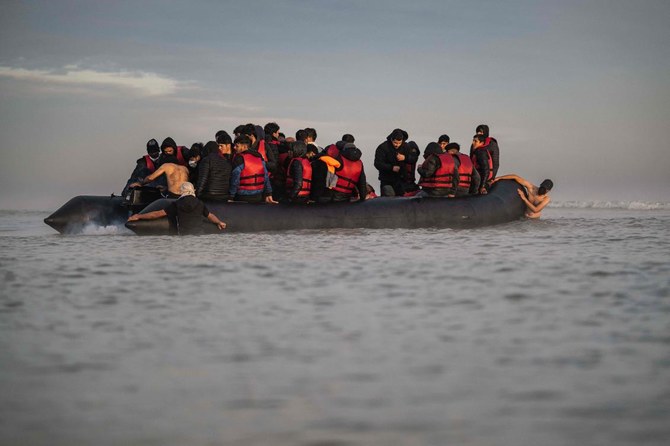
- People smugglers typically overload rickety dinghies, leaving them barely afloat and at risk of being lashed by the waves
The French coast guard confirmed there was a failed attempt to cross the Channel and said police were operating at a beach following the incident on Tuesday morning, adding there were several ‘lifeless bodies’.
Local police did not immediately reply to a Reuters request for comment.
The coast guard spokesperson said its agents were still operating at sea on Tuesday morning after what the official called a ‘busy’ morning, with several crossing attempts.
The Channel between France and Britain is one of the world’s busiest shipping lanes and currents are strong, making the crossing on small boats dangerous.
People smugglers typically overload rickety dinghies, leaving them barely afloat and at risk of being lashed by the waves as they try to reach British shores.
Asia hit hardest by climate, weather disasters in 2023— UN
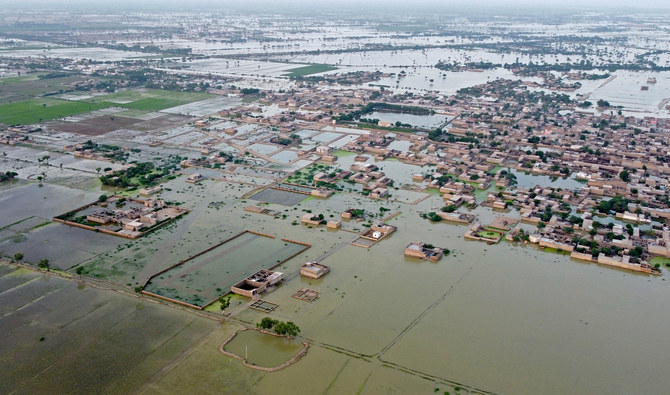
- Climate change exacerbated severity of weather disasters last year, sauys World Meteorological Organization
- 79 disasters, mostly floods and storms, associated with water-related weather hazards were reported in Asia in 2023
Geneva: Asia was the world’s most disaster-hit region from climate and weather hazards in 2023, the United Nations said Tuesday, with floods and storms the chief cause of casualties and economic losses.
Global temperatures hit record highs last year, and the UN’s weather and climate agency said Asia was warming at a particularly rapid pace.
The World Meteorological Organization said the impact of heatwaves in Asia was becoming more severe, with melting glaciers threatening the region’s future water security.
The WMO said Asia was warming faster than the global average, with temperatures last year nearly two degrees Celsius above the 1961 to 1990 average.
“The report’s conclusions are sobering,” WMO chief Celeste Saulo said in a statement.
“Many countries in the region experienced their hottest year on record in 2023, along with a barrage of extreme conditions, from droughts and heatwaves to floods and storms.
“Climate change exacerbated the frequency and severity of such events, profoundly impacting societies, economies, and, most importantly, human lives and the environment that we live in.”
The State of the Climate in Asia 2023 report highlighted the accelerating rate of key climate change indicators such as surface temperature, glacier retreat and sea level rise, saying they would have serious repercussions for societies, economies and ecosystems in the region.
“Asia remained the world’s most disaster-hit region from weather, climate and water-related hazards in 2023,” the WMO said.
The annual mean near-surface temperature over Asia in 2023 was the second highest on record, at 0.91 degrees Celsius above the 1991-2020 average, and 1.87 C above the 1961-1990 average.
Particularly high average temperatures were recorded from western Siberia to central Asia, and from eastern China to Japan, the report said, with Japan having its hottest summer on record.
As for precipitation, it was below normal in the Himalayas and in the Hindu Kush mountain range in Pakistan and Afghanistan.
Meanwhile southwest China suffered from a drought, with below-normal precipitation levels in nearly every month of the year.
The High-Mountain Asia region, centered on the Tibetan Plateau, contains the largest volume of ice outside of the polar regions.
Over the last several decades, most of these glaciers have been retreating, and at an accelerating rate, the WMO said, with 20 out of 22 monitored glaciers in the region showing continued mass loss last year.
The report said 2023 sea-surface temperatures in the northwest Pacific Ocean were the highest on record.
Last year, 79 disasters associated with water-related weather hazards were reported in Asia. Of those, more than 80 percent were floods and storms, with more than 2,000 deaths and nine million people directly affected.
“Floods were the leading cause of death in reported events in 2023 by a substantial margin,” the WMO said, noting the continuing high level of vulnerability of Asia to natural hazard events.
Hong Kong recorded 158.1 millimeters of rainfall in one hour on September 7 — the highest since records began in 1884, as a result of a typhoon.
The WMO said there was an urgent need for national weather services across the region to improve tailored information to officials working on reducing disaster risks.
“It is imperative that our actions and strategies mirror the urgency of these times,” said Saulo.
“Reducing greenhouse gas emissions and adapting to the evolving climate is not merely an option, but a fundamental necessity.”
UN officials urge UK to reconsider plan to transfer asylum seekers to Rwanda
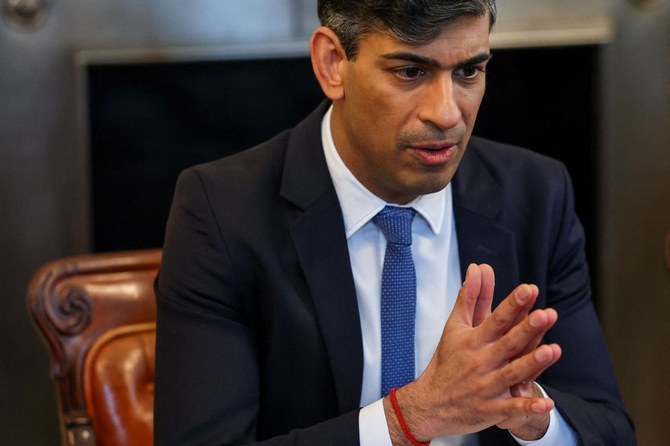
- UN called on the UK to instead take practical measures to address irregular flows of migrants and refugees
GENEVA: Two United Nations top officials on Tuesday called on the UK to reconsider its plan to transfer asylum seekers to Rwanda, warning the move would have a harmful impact on human rights and refugee protection.
In a joint statement, Filippo Grandi, the UN High Commissioner for Refugees, and Volker Turk, the UN High Commissioner for Human Rights, called on the UK to instead take practical measures to address irregular flows of migrants and refugees.
British Prime Minister Rishi Sunak promised on Monday to start sending asylum seekers to Rwanda within 10 to 12 weeks as the upper house of parliament passed legislation that had been delayed for weeks by attempts to alter the plan.
Asia hit hardest by climate, weather disasters in 2023:UN
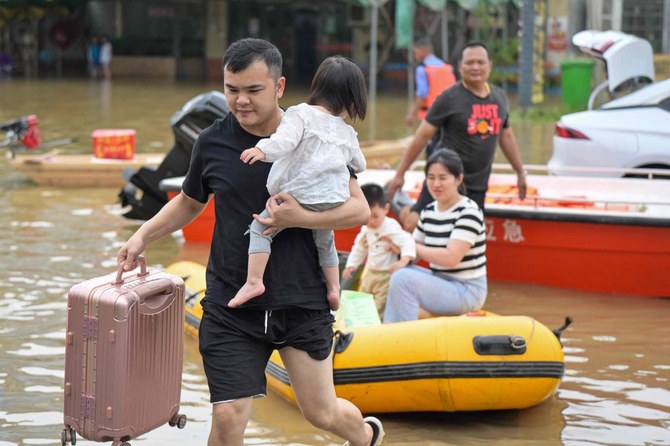
- UN’s weather and climate agency said Asia was warming at a particularly rapid pace
GENEVA: Asia was the world’s most disaster-hit region from climate and weather hazards in 2023, the United Nations said Tuesday, with floods and storms the chief cause of casualties and economic losses.
Global temperatures hit record highs last year, and the UN’s weather and climate agency said Asia was warming at a particularly rapid pace.
The World Meteorological Organization said the impact of heatwaves in Asia was becoming more severe, with melting glaciers threatening the region’s future water security.
The WMO said Asia was warming faster than the global average, with temperatures last year nearly two degrees Celsius above the 1961 to 1990 average.
“The report’s conclusions are sobering,” WMO chief Celeste Saulo said in a statement.
“Many countries in the region experienced their hottest year on record in 2023, along with a barrage of extreme conditions, from droughts and heatwaves to floods and storms.
“Climate change exacerbated the frequency and severity of such events, profoundly impacting societies, economies, and, most importantly, human lives and the environment that we live in.”
The State of the Climate in Asia 2023 report highlighted the accelerating rate of key climate change indicators such as surface temperature, glacier retreat and sea level rise, saying they would have serious repercussions for societies, economies and ecosystems in the region.
“Asia remained the world’s most disaster-hit region from weather, climate and water-related hazards in 2023,” the WMO said.
Ranging disasters
The annual mean near-surface temperature over Asia in 2023 was the second highest on record, at 0.91 degrees Celsius above the 1991-2020 average, and 1.87 C above the 1961-1990 average.
Particularly high average temperatures were recorded from western Siberia to central Asia, and from eastern China to Japan, the report said, with Japan having its hottest summer on record.
As for precipitation, it was below normal in the Himalayas and in the Hindu Kush mountain range in Pakistan and Afghanistan.
Meanwhile southwest China suffered from a drought, with below-normal precipitation levels in nearly every month of the year.
The High-Mountain Asia region, centered on the Tibetan Plateau, contains the largest volume of ice outside of the polar regions.
Over the last several decades, most of these glaciers have been retreating, and at an accelerating rate, the WMO said, with 20 out of 22 monitored glaciers in the region showing continued mass loss last year.
The report said 2023 sea-surface temperatures in the northwest Pacific Ocean were the highest on record.
Water-related hazards
Last year, 79 disasters associated with water-related weather hazards were reported in Asia. Of those, more than 80 percent were floods and storms, with more than 2,000 deaths and nine million people directly affected.
“Floods were the leading cause of death in reported events in 2023 by a substantial margin,” the WMO said, noting the continuing high level of vulnerability of Asia to natural hazard events.
Hong Kong recorded 158.1 millimeters of rainfall in one hour on September 7 — the highest since records began in 1884, as a result of a typhoon.
The WMO said there was an urgent need for national weather services across the region to improve tailored information to officials working on reducing disaster risks.
“It is imperative that our actions and strategies mirror the urgency of these times,” said Saulo.
“Reducing greenhouse gas emissions and adapting to the evolving climate is not merely an option, but a fundamental necessity.”
Jury deliberating in Iraq Abu Ghraib prison abuse civil case; contractor casts blame on Army

- Raisi said the killings by Israel in Gaza were being committed with the support of the United States and other Western countries
ALEXANDRIA, Virginia: A lawyer for the military contractor being sued by three survivors of the notorious Abu Ghraib prison in Iraq told jurors Monday that the plaintiffs are suing the wrong people.
“If you believe they were abused ... tell them to make their claim against the US government,” said John O’Connor, defense attorney for Reston, Virginia-based military contractor CACI, during closing arguments at the civil trial in federal court. “Why didn’t they sue the people who actively abused them?”
The lawsuit brought by the three former Abu Ghraib detainees marks the first time a US jury has weighed claims of abuse at the prison, which was the site of a worldwide scandal 20 years ago when photos became public showing US soldiers smiling as they inflicted abusive and humiliating treatment on detainees in the months after the US invasion and occupation of Iraq.
The suit alleges that civilian interrogators supplied by CACI to Abu Ghraib contributed to the torture the plaintiffs by conspiring with military police to “soften up” detainees for interrogations.
CACI, in its closing arguments, relied in part on a legal theory known as the “borrowed servant doctrine,” which states an employer can’t be liable for its employees’ conduct if another entity is controlling and directing those employees’ work.
In this case, CACI says the Army was directing and controlling its employees in their work as interrogators.
Lawyers for the plaintiffs disputed that CACI relinquished control of its interrogators to the Army. At trial, they introduced evidence that CACI’s contract with the Army required CACI to supervise its own employees. Jurors also saw a section of the Army Field Manual that pertains to contractors and states that “only contractors may supervise and give direction to their employees.
Muhammad Faridi, one of the plaintiffs’ lawyers, told jurors that the case is simpler than CACI’s lawyers are trying to make it.
He said that if CACI interrogators conspired with military police to inflict abuse on detainees to soften them up for interrogations, then the jury can find CACI liable even if CACI interrogators never themselves inflicted abuse on any of the three plaintiffs.
All three plaintiffs testified to horrible treatment including beatings, sexual assaults, being threatened with dogs and forced to wear women’s underwear, but said the abuse was either inflicted by soldiers, or by civilians who couldn’t be identified as CACI workers. In some cases, the detainees said they couldn’t see who was abusing them because they had bags over their heads.
As evidence of CACI’s complicity, jurors heard testimony from two retired generals who investigated the Abu Ghraib scandal in 2004; both concluded that CACI interrogators engaged in misconduct.
Faridi told the jury that while many of the soldiers who abused detainees were convicted and sentenced to prison, CACI has not yet been held accountable.
“When our country’s military found out about the abuse, they didn’t cover it up,” Faridi said. “Our country’s military held the military police members who were perpetrating the abuse accountable. CACI escaped liability.”
And Faridi said that even when the Army asked CACI to hold its its interrogators responsible, it still sought to evade responsibility. In May 2004, the Army asked CACI to fire one of its interrogators, Dan Johnson, after one of the Abu Ghraib photos showed Johnson interrogating a detainee who was forced into an awkward crouching position that investigators concluded was an illegal stress position.
CACI contested Johnson’s dismissal, writing that the “photo depicts what appears to be a relatively relaxed scene” and saying that “squatting is common and unremarkable among Iraqis.”
“I’ll leave that to you to consider whether you find that offensive,” Faridi told the jury Monday.
At trial, CACI employees testified they defended Johnson’s work because Army personnel had asked them through back channels to do so. O’Connor said that out of the many hundreds of photos of abuse at Abu Ghraib, the photo of Johnson is the only one depicting a CACI employee, and it shows him questioning not one of the plaintiffs but an Iraqi policeman after someone had smuggled a gun into the prison and shot at military police.
O’Connor also apologized for parts of his case that were “long, annoying and boring” but said he had no choice because the US government claimed that some evidence, including the identities of interrogators, was classified. So jurors, rather than hearing live testimony, were subjected to long audio recordings in which the interrogators’ voices were doctored and their answers were often interrupted by government lawyers who instructed them to not answer the question.
The trial was delayed by more than 15 years of legal wrangling and questions over whether CACI could be sued. Some of the debate focused on the question of immunity — there had long been an assumption that the US government would hold sovereign immunity from a civil suit, and CACI argued that, as a government contractor, it would enjoy derivative immunity.
But US District Judge Leonie Brinkema, in a first-of-its-kind ruling, determined that the US government cannot claim immunity in cases involving fundamental violations of international norms, such as torture allegations. And, as a result, CACI could not claim any kind of derivative immunity, either.
The eight-person jury deliberated about three hours before pausing Monday afternoon without reaching a verdict. Deliberations are set to resume Wednesday.


